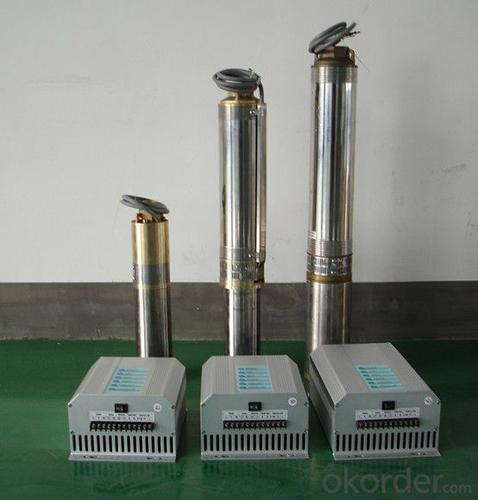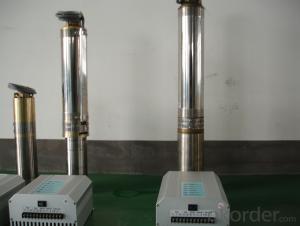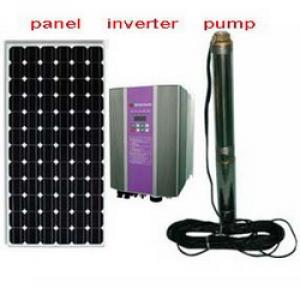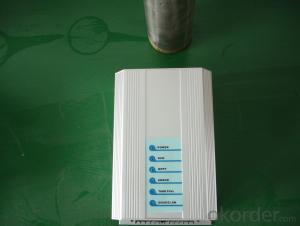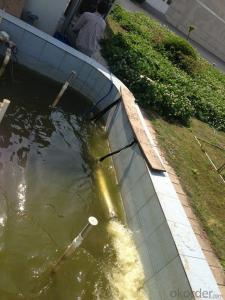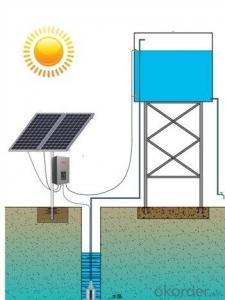12 Volt DC Solar Water Pump
- Loading Port:
- China Main Port
- Payment Terms:
- TT OR LC
- Min Order Qty:
- -
- Supply Capability:
- -
OKorder Service Pledge
OKorder Financial Service
You Might Also Like
Item Description :
This superb new addition to our solar fountain range comes with a 10w solar panel,and a powerful fountain pump that is capable of producing fountains of up to 2m in height. As well as being easy to set up and use.Instruction manual is supplied for assembly and maintenance.
Solar Fountain Key Features :
Powered by direct sunlight
No high voltage electric mains required
Safe for children
Max. height of fountain: 2M
Max. flow capacity: 800 L/H(176 GAL)
10W Polycrystalline solar panel included
18V DC brushless pump
Solar Pump Features :
Can produce fountains up to : 2M (tube height) 1.4M (fountain height)
Comes with multiple nozzle accessories
Cable Length : 5M
Solar Panel Features :
10W peak power.
Polycrystalline highly efficient solar panel
Comes mounted in aluminium frame
Comes with ground stake and rotating knob so you can angle your panel toward the sun
What You Will Get :
10W solar panel
Solar pump
Ground Sake
Nozzle accessories
Precautions :
DO NOT alter or change the product itself or its components
Operate pump in freshwater only, never above 50 degrees celsius
Keep away from flammable liquids
Do not connect to any other power supply other than the included
- Q: Can a solar pump be used for water supply in off-grid dairy farms?
- Yes, a solar pump can be used for water supply in off-grid dairy farms. Solar pumps are an ideal solution for off-grid locations as they rely on solar energy to power the pump, eliminating the need for grid electricity. They can efficiently pump water from wells, boreholes, or other water sources to meet the water requirements of dairy farms. Additionally, solar pumps are cost-effective, environmentally friendly, and require minimal maintenance, making them a suitable choice for off-grid dairy farms.
- Q: What is the average lifespan of a solar pump?
- The average lifespan of a solar pump typically ranges from 15 to 25 years.
- Q: Are there any limitations on the water pressure that can be achieved with a solar pump?
- Yes, there are limitations on the water pressure that can be achieved with a solar pump. The maximum water pressure that can be achieved depends on factors such as the type and efficiency of the solar pump, the power of the solar panels, and the depth and distance the water needs to be pumped. Generally, solar pumps have lower pressure capabilities compared to electric or diesel pumps, but advancements in technology have led to more powerful solar pumps that can achieve higher water pressures.
- Q: Are there any special considerations for installing a solar pump in sandy or dusty environments?
- Yes, there are several special considerations for installing a solar pump in sandy or dusty environments. Firstly, it is important to choose a pump that is specifically designed for such environments. These pumps are usually equipped with features like dust-proof seals, filters, and protective coatings to prevent sand and dust from entering the system. It is crucial to ensure that the pump is rated for the specific environmental conditions and has been tested for durability in sandy or dusty environments. Secondly, the location of the solar panels should be carefully considered. In sandy or dusty areas, the panels can quickly accumulate dirt and sand, reducing their efficiency. Regular cleaning and maintenance of the panels will be necessary to ensure optimum performance. Additionally, it may be beneficial to install the panels at an angle that allows for self-cleaning, where rainwater can wash away the accumulated debris. Furthermore, the pump's intake should be positioned above ground level to prevent sand and dust from being drawn into the system. Installing a protective screen or mesh around the intake can further safeguard against debris entering the pump. Additionally, the electrical connections and wiring should be properly sealed to prevent sand and dust from causing damage or short circuits. It is advisable to use weatherproof and dust-resistant components, such as connectors, junction boxes, and conduits, to protect the system from environmental elements. Regular maintenance and cleaning of the pump and its components will be essential in sandy or dusty environments. This includes inspecting and cleaning the pump's filters, checking for any signs of wear or damage, and ensuring proper lubrication of moving parts. Lastly, it is crucial to consider the impact of sand and dust on the pump's performance and efficiency. The accumulation of debris can lead to reduced water flow, increased energy consumption, and potential damage to the pump over time. Therefore, frequent monitoring and prompt maintenance will be necessary to maintain the pump's optimal functionality in sandy or dusty environments.
- Q: Are there any government subsidies or incentives available for installing solar pumps?
- Yes, there are government subsidies and incentives available for installing solar pumps. These vary from country to country and may include grants, tax credits, reduced interest rates on loans, and feed-in tariffs. It is recommended to research specific local or national programs to determine the eligibility criteria and benefits provided.
- Q: Are there any certifications or standards for solar pumps?
- Yes, there are certifications and standards for solar pumps. Some widely recognized certifications include the International Electrotechnical Commission (IEC) 61215 and 61730 for solar photovoltaic modules, and the Solar Keymark certification for solar thermal products. Additionally, various countries may have their own national standards and certifications for solar pumps to ensure their safety, efficiency, and compliance with local regulations.
- Q: Are there any government incentives or rebates for installing a solar pump?
- Yes, there are government incentives and rebates available for installing a solar pump. Many countries and regions offer various programs and schemes to promote the use of renewable energy, including solar-powered technologies like solar pumps. These incentives can range from tax credits, grants, subsidies, and rebates, which can significantly reduce the upfront costs of installing a solar pump and make it more financially viable for individuals and businesses. It is recommended to check with local government agencies or renewable energy organizations to learn about specific incentives available in your area.
- Q: What is the maximum operating temperature for a solar pump?
- The maximum operating temperature for a solar pump typically depends on the specific model and manufacturer. However, most solar pumps can operate efficiently at temperatures ranging from 40 to 60 degrees Celsius (104 to 140 degrees Fahrenheit). It is essential to consult the product specifications provided by the manufacturer for accurate information regarding the maximum operating temperature of a particular solar pump.
- Q: Are there any safety concerns with using a solar pump?
- Yes, there can be safety concerns with using a solar pump. Some of the potential safety concerns include electric shock if not properly installed or maintained, overheating or fire hazards in extreme weather conditions, and potential for damage or injury due to improper handling or installation of the pump or its components. It is important to follow proper installation, maintenance, and usage guidelines provided by the manufacturer to ensure safe and efficient operation of the solar pump.
- Q: Can solar pumps be integrated with existing generator or battery backup systems?
- Yes, solar pumps can be integrated with existing generator or battery backup systems. By combining solar power with existing backup systems, it ensures a reliable and continuous water supply even during periods of low sunlight or power outage. This integrated approach provides a sustainable solution that maximizes the efficiency and reliability of water pumping systems.
Send your message to us
12 Volt DC Solar Water Pump
- Loading Port:
- China Main Port
- Payment Terms:
- TT OR LC
- Min Order Qty:
- -
- Supply Capability:
- -
OKorder Service Pledge
OKorder Financial Service
Similar products
Hot products
Hot Searches
Related keywords

